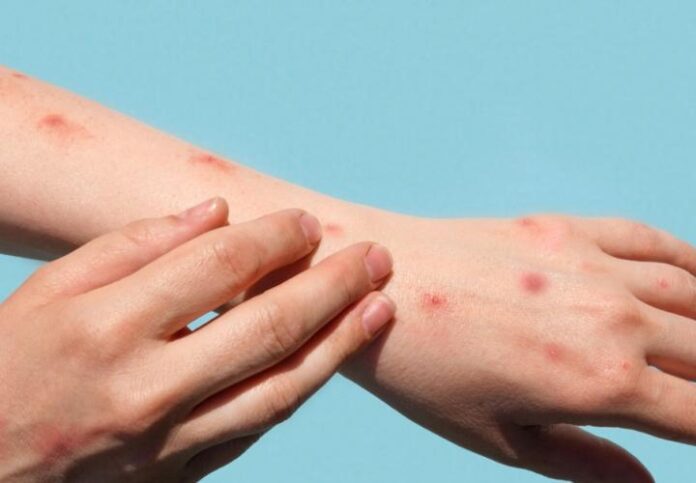The disease is rapidly transmissible and can cause complications in vulnerable populations
By ZAFREEN SHAIK— science@theaggie.org
Last month, the World Health Organization (WHO) Director-General Dr. Tedros Adhanom Ghebreyesus declared the mpox outbreak, formerly known as monkeypox, a global public health emergency. Once limited to certain regions of Africa, the virus has now spread to over 122 countries, 115 of which had never seen a case before. With more than 100,000 confirmed infections globally, the resurgence — driven by the Clade IIb strain — intensified concerns, prompting public health officials to mobilize efforts worldwide to contain the virus.
Dr. Dean Blumberg, the chief of pediatric infectious diseases at UC Davis Children’s Hospital, commented on the spread of mpox in an interview with UC Davis Health.
“Mpox clade 1 is what is circulating now in Africa — including African countries that haven’t reported cases of mpox in the past,” the article reads. “As of Sept. 3, 2024, cases have also been reported in Sweden, Thailand and Pakistan after travel to Africa.”
Mpox is caused by the monkeypox virus, which is part of the Orthopoxvirus genus and closely related to the smallpox virus (Variola virus). While mpox generally results in milder symptoms compared to smallpox, its ability to spread rapidly and infect vulnerable populations underscores its significance as a public health threat. Transmission primarily occurs through direct contact with an infected person’s bodily fluids, respiratory droplets or contaminated materials such as bedding or clothing. Human-to-human transmission has been highlighted in recent outbreaks, particularly through close or intimate physical contact, making it a crucial component of the global spread in 2022 to 2023.
Clinically, mpox manifests with symptoms such as fever, swollen lymph nodes and a distinct rash that typically starts on the face or genital area. The rash progresses through several stages, forming vesicles, pustules and eventually scabs. Infected individuals may also experience body aches and fatigue. Although the disease is often self-limiting, complications can arise, particularly in vulnerable populations such as children, immunocompromised individuals and those in regions with limited healthcare access. This makes controlling the spread even more critical.
First identified in monkeys in 1958, mpox was recognized as a zoonotic disease that could also infect humans. Its endemic presence in Central and West Africa is well documented; thousands of cases are reported each year in the Democratic Republic of the Congo (DRC). A notable event occurred in 2003 when an outbreak in the United States, linked to the importation of wild animals, highlighted mpox’s potential to spread beyond Africa. Though this outbreak was quickly contained, it served as an early warning of the virus’ global reach.
Fast forward to 2024 and the ongoing global outbreak of Clade II mpox, particularly the IIb subclade, has led to widespread transmission. Although Clade I mpox has not been reported in the U.S., Clade II continues to circulate at low levels in the country, raising concerns about sustained transmission. Global health efforts now focus on curbing the spread, especially in regions with fragile healthcare systems.
“Testing is key for people to get treatment and care as early as possible and prevent further spread,” WHO states. “Since 2022, WHO has delivered around 150,000 diagnostic tests for mpox globally, of which over a quarter have gone to countries in the African Region. In the coming weeks, WHO will deliver another 30,000 tests to African countries.”
At UC Davis and other healthcare institutions, telehealth appointments are available for individuals concerned about mpox exposure. UC Davis Health has also made mpox vaccinations available to high-risk groups, including patients, faculty and staff.
Blumberg confirmed that JYNNEOS is approved for use in both adults and children, though it is not part of the routine vaccine schedule for children. In addition to vaccines, antiviral treatments and immunoglobulins are available, particularly for vulnerable groups like infants under six months old. The JYNNEOS vaccine, administered in two doses, provides about 85% protection if given within four days of exposure and can lessen the severity of the disease if administered up to two weeks later.
As mpox continues to spread globally, UC Davis and other institutions across the US are responding by promoting vaccinations, increasing awareness and providing medical support to those at risk. While the overall risk remains low for the general population, vigilance, timely vaccination and adherence to public health guidelines are essential to keeping the campus and broader community safe from mpox.
“Expanding access to diagnostic services is urgently needed as tests are essential to critical measures such as strengthened laboratory capacity, improved case investigation, contact tracing, surveillance data collection, and timely reporting,” WHO states. “As a package, these help countries identify chains of transmission, detect cases early, prevent further spread, and monitor the virus in real-time.”
Written by: Zafreen Shaik— science@theaggie.org





